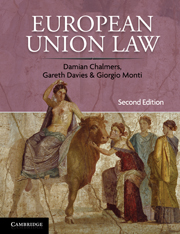Book contents
- Frontmatter
- Contents
- Map
- Preface
- Abbreviations
- Table of Cases
- Table of Treaties, Instruments and Legislation
- Table of Equivalents
- Electronic Working Paper Series
- 1 European Integration and the Treaty on European Union
- 2 The EU Institutions
- 3 Union Law-making
- 4 The EU Judicial Order
- 5 The Authority of EU Law
- 6 Fundamental Rights
- 7 Rights and Remedies in National Courts
- 8 Infringement Proceedings
- 9 Governance
- 10 Judicial Review
- 11 EU citizenship
- 12 EU Law and Non-EU Nationals
- 13 Equal Opportunities Law and Policy
- 14 EU Criminal Law
- 15 External Relations
- 16 The Internal Market
- 17 Economic and Monetary Union
- 18 The Free Movement of Goods
- 19 The Free Movement of Services
- 20 The Pursuit of an Occupation in Another Member State
- 21 Trade Restrictions and Public Goods
- 22 EU Competition Law: Function and Enforcement
- 23 Antitrust and Monopolies
- 24 State Regulation and EU Competition Law
- Index
2 - The EU Institutions
- Frontmatter
- Contents
- Map
- Preface
- Abbreviations
- Table of Cases
- Table of Treaties, Instruments and Legislation
- Table of Equivalents
- Electronic Working Paper Series
- 1 European Integration and the Treaty on European Union
- 2 The EU Institutions
- 3 Union Law-making
- 4 The EU Judicial Order
- 5 The Authority of EU Law
- 6 Fundamental Rights
- 7 Rights and Remedies in National Courts
- 8 Infringement Proceedings
- 9 Governance
- 10 Judicial Review
- 11 EU citizenship
- 12 EU Law and Non-EU Nationals
- 13 Equal Opportunities Law and Policy
- 14 EU Criminal Law
- 15 External Relations
- 16 The Internal Market
- 17 Economic and Monetary Union
- 18 The Free Movement of Goods
- 19 The Free Movement of Services
- 20 The Pursuit of an Occupation in Another Member State
- 21 Trade Restrictions and Public Goods
- 22 EU Competition Law: Function and Enforcement
- 23 Antitrust and Monopolies
- 24 State Regulation and EU Competition Law
- Index
Summary
INTRODUCTION
This chapter looks at the institutional settlement that governs the European Union.
Section 2 considers the organisation and powers of the European Commission. An independent administration, the Commission is the central institution for proposing legislation and for securing national government compliance with that legislation. It has been delegated significant law-making powers and is responsible for many of the executive tasks of the Union.
The wide-ranging nature of the Commission's powers has led to considerable specialisation within the Commission and to its delegating significant administrative powers to specialised agencies. It has also resulted in the Commission being dependent on national administrations for much of the administration of the Union whilst having a responsibility for supervising the latter's performance. The consequence is an executive order with extensive powers, marked by specialisation and mutually reinforcing relations between different administrative actors, which escapes accountability to either pan-European or national democratic constituencies.
Section 3 considers the Council of Ministers. The Council is composed of national ministers and has the final power of decision over almost all fields of EU law. Much debate centres on the level of national influence within the Council, in particular whether a measure is decided by unanimity or by qualified majority voting (QMV) and the weighting of national votes within QMV. In practice, most Decisions are taken without a vote and this shifts the question to how influence is exercised and the quality of debate that takes place.
- Type
- Chapter
- Information
- European Union LawCases and Materials, pp. 52 - 91Publisher: Cambridge University PressPrint publication year: 2010



